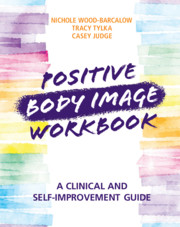Book contents
- Positive Body Image Workbook
- Positive Body Image Workbook
- Copyright page
- Contents
- Foreword
- Acknowledgments
- Section I Introduction and Preparation
- Section II The Journey Toward Positive Body Image
- Chapter 4 Appearance Ideals and Media Literacy
- Chapter 5 Weight Stigma versus Weight Inclusivity
- Chapter 6 Body Acceptance by Others
- Chapter 7 Defining Beauty and Cultural Pride
- Chapter 8 Self-Compassion and Body Image Flexibility
- Chapter 9 Approaching Our Bodies
- Chapter 10 Body Appreciation
- Chapter 11 Functionality Appreciation
- Chapter 12 Embodiment
- Chapter 13 Objectification and Self-Objectification
- Chapter 14 Sexual Intimacy
- Chapter 15 Social Comparison
- Chapter 16 Body Talk
- Chapter 17 Protective Filtering
- Chapter 18 Rippling Effect: Mentorship
- Chapter 19 Self-Care
- Chapter 20 Fueling Our Bodies
- Chapter 21 Life-Enhancing Movement
- Chapter 22 Adaptive Appearance Investment and Quality of Life
- Section III Continuing Our Journeys
- Index
- References
Chapter 11 - Functionality Appreciation
from Section II - The Journey Toward Positive Body Image
Published online by Cambridge University Press: 02 February 2021
- Positive Body Image Workbook
- Positive Body Image Workbook
- Copyright page
- Contents
- Foreword
- Acknowledgments
- Section I Introduction and Preparation
- Section II The Journey Toward Positive Body Image
- Chapter 4 Appearance Ideals and Media Literacy
- Chapter 5 Weight Stigma versus Weight Inclusivity
- Chapter 6 Body Acceptance by Others
- Chapter 7 Defining Beauty and Cultural Pride
- Chapter 8 Self-Compassion and Body Image Flexibility
- Chapter 9 Approaching Our Bodies
- Chapter 10 Body Appreciation
- Chapter 11 Functionality Appreciation
- Chapter 12 Embodiment
- Chapter 13 Objectification and Self-Objectification
- Chapter 14 Sexual Intimacy
- Chapter 15 Social Comparison
- Chapter 16 Body Talk
- Chapter 17 Protective Filtering
- Chapter 18 Rippling Effect: Mentorship
- Chapter 19 Self-Care
- Chapter 20 Fueling Our Bodies
- Chapter 21 Life-Enhancing Movement
- Chapter 22 Adaptive Appearance Investment and Quality of Life
- Section III Continuing Our Journeys
- Index
- References
Summary
Often, when we think about our bodies, we think in terms of how we look – our size, shape, muscularity, fat, and other physical features such as our hair, skin, teeth, and face. We tend to focus less on what our bodies do for us, such as carry a child, perform labor, walk our dog, digest food, observe a beautiful sunset, read and comprehend the ideas in this workbook, engage in a deep conversation, enjoy a massage, hug the ones we love, feel and express empathy, heal us from illness, breathe in oxygen, keep our hearts beating, and more. In short, the functions of our bodies keep us alive – not just physically but also emotionally. Body functionality is everything the body can do or is capable of doing [1], and can be different for everyone based on physical abilities and limitations due to illnesses, injuries, development, aging, and surgeries.
- Type
- Chapter
- Information
- Positive Body Image WorkbookA Clinical and Self-Improvement Guide, pp. 156 - 174Publisher: Cambridge University PressPrint publication year: 2021



